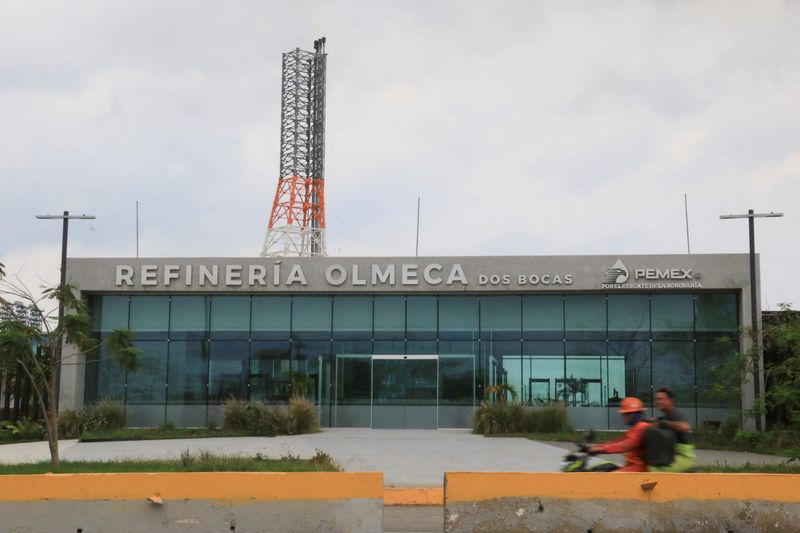
By Stefanie Eschenbacher, Shariq Khan and Trixie Yap
MEXICO CITY/NEW YORK/SINGAPORE (Reuters) – Mexico is seeking to import more motor fuel for next year than it had previously planned, to compensate for delays in the startup of its new Olmeca refinery, half a dozen traders said, marking an about-turn by state energy company Pemex.
The purchases for next year signal that the refinery would not be ready any time soon, a damper on the legacy of outgoing President Andres Manuel Lopez Obrador, who commissioned it after he was elected in 2018 to wean the country off expensive imports.
Pemex, the most indebted among peers worldwide, is a major crude producer but relies heavily on gasoline and diesel imports because its six ageing refineries struggle to process its heavy Maya crude, producing instead record amounts of fuel oil.
Earlier this year, Pemex had indicated to suppliers that it planned to significantly cut imports of both fuels because the 340,000-barrel-per-day (bpd) refinery would finally work at capacity, the market sources said.
Reuters, however, revealed last month that the refinery is unlikely to produce any commercially viable fuels from crude before the end of the year as engineers were still working on key parts more than two years after it was inaugurated.
The Paris-based International Energy Agency was also skeptical. In its June report, it wrote that the refinery was unlikely to come online any sooner than the fourth quarter of next year.
Reuters was unable to determine by how much Pemex had earlier planned to cut imports for next year. Pemex did not respond to a request for comment.
However, Mexico is now back in the market for deals that would guarantee fuel supplies through the rest of this year and next, and has made inquiries in the U.S. and across Asia, the traders said.
Pemex traders are seeking similar volumes to those they previously imported, a trader at a large commodity house said. That was confirmed by another U.S.-based trader working for a large refiner in Latin America.
They have also made inquiries with Chinese refiners in the past two weeks, but no deals have been made yet, two Asian traders said.
New deals for 2025 supplies would contradict what Pemex CEO Octavio Romero said earlier this month – that Mexico would drastically lower imports of fuels in the coming months.
The Olmeca refinery would start up in next days, he said then. New coking units in the Tula and Salina Cruz refineries will also boost output to above national demand and Pemex would have a surplus, he added.
In the first five months of the year, Pemex produced 306,547 bpd of gasoline and 181,565 bpd of diesel in its six domestic refineries, official data showed. It imported 358,545 bpd of gasoline and 128,215 bpd of diesel.
SPOT PURCHASES AMID DELAY
Without the new refinery working at capacity, low imports could cause a fuel shortage next year that would be an embarrassment to the government and incoming President Claudia Sheinbaum, three Mexican traders said.
Pemex and the government have pushed back the startup date of the refinery, whose cost has more than doubled to roughly $17 billion, at least a dozen times over the past years.
Mexico typically imports most of its fuels from the U.S. as shipping from Asia takes longer and is more expensive, though variations in prices in Asia can make the arbitrage economical.

Pemex bought at least three spot cargoes for early August-loading gasoline cargoes of around 300,000 barrels each in the past week from Asia – likely from China and Singapore – as arbitrage economics were lucrative, the traders added.
However, to ship cargoes from northeast or southeast Asia to Mexico on a contractual term basis would be more challenging as it means the arbitrage must be profitable throughout the period.
This post is originally published on INVESTING.




